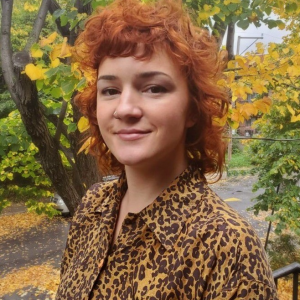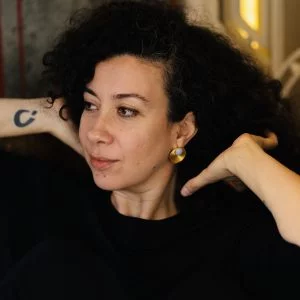To enable increased interaction between undergraduate students and graduate students pursuing relevant research, New College hosts senior doctoral fellowships for each of our academic programs.
Each fellow is a senior graduate student who contributes to the intellectual life of the college, including mentoring undergraduate students, giving an academic seminar and participating in New College academic and community events.
The fellowships further help our graduate students by providing them with dedicated space at New College, a small stipend and the opportunity to network with current faculty members.
Applications for Senior Doctoral Fellowship open each spring. For more information on this program, contact nc.principal@utoronto.ca.
Meet the 2022-23 Critical Studies in Equity and Solidarity SDFs

Hannah Quinn
Hannah Quinn is a 5th year PhD Candidate and Vanier Scholar in Anthropology and Sexual Diversity Studies at the University of Toronto. She is working with intellectually disabled adults in Montréal, Québec to build consent cultures and dismantle ableism. Hannah completed her ethnographic fieldwork in 2021 at day centres that provide social and education services to the anglophone disability community in Montréal. Her research focuses on theories of consent and the modes of relationality that cultures of consent and coercion both allow and foreclose. Specifically, Hannah is working with her participants to understand how notions of ‘capacity to consent’ buttress ableist structures as well as limit the kinds of intimacies her participants can engage and experience. Methodologically, she is invested in challenging assumptions about who can and cannot participate in research by co-creating accessible research methods that meet the needs of participants. Her work emerges at the intersection of anthropology, disability justice, and queer studies. As an applied anthropologist committed to public-facing scholarship, Hannah is invested in community-driven work, feminist research methods, and accessibility as a research ethic and relational mode. Hannah is also an educator and facilitator with expertise in sex education, consent practices, and accessibility.
Hannah Quinn: CSES Doctoral Fellow Profile
By Dina Mahafza, CSES Work Study Student
Q1: Please tell us a bit about yourself
A:
My name is Hannah Quinn, and I am in my fifth year of my Ph.D. in the department of anthropology and the collaborative specialization in sexual diversity studies. I’ve just returned from parental leave and am figuring out how to be a parent to a now one-year-old and a grad student simultaneously. I am in the writing stage and trying to fall back in love with the craft of writing. I have a black fluffy dog named Chloe who lives in my apartment rent-free, I love cooking meals for large groups of people, and in another life I might have become a hairdresser or an antique jewelry appraiser. These days I mostly enjoy getting outside for long walks with my kiddo.
Q2: Can you tell CSES students more about your doctoral research, thesis, and postdoctoral research goals?
A:
My research is focused on questions about the ‘capacity to consent’, not only to things like sexuality and intimacy but also bodily autonomy, and consent to participate in research. I conducted my ethnographic fieldwork in Montreal prior to and during the pandemic with adults labeled as intellectually disabled. We have a lot to learn from folks who live under conditions of coercion and surveillance to understand what a non-coercive consent culture might look like. Adults labeled as intellectually disabled are often presumed to be incapable of consenting. Therefore, the questions that motivate my research are: What do you already know about consent? What kinds of relations and conditions facilitate your capacity to meaningfully consent? What might an anti-ableist consent culture look like?
I strive to make the university and research more accessible to a broader number of people, particularly, those who have been historically excluded from academics. I am committed to this through anti-ableist research practices and accessible research methods. Many of my participants are very unlikely to find themselves participating in academic dialogue or contributing to policies and laws that directly affect their lives. As such, my work is centered around bringing their perspectives and experiences to bear on our assumptions about academia, knowledge production, and expertise.
In terms of my research goals, I am very interested in doing applied work. I’ve had the pleasure of bringing my research findings to public policy consultation and have worked with a team of educators to build a consent-based and anti-ableist sex ed curriculum for adults labelled as intellectually disabled here in Quebec. I would love to see myself in an environment where my research findings are contributing to beneficial outcomes for people, whether that is through policy change, community-based research, academia, the public sector, and so on.
Q3: What draws you to CSES? How do our program areas/frameworks connect with and/or impact your research?
A:
One thing I appreciate about CSES is the program’s interdisciplinary nature. While I have acquired very specific training in anthropology during my undergraduate and master’s degrees, I have always thought of myself as an interdisciplinary scholar. I was drawn to the potential of merging critical disability studies, queer theory, public policy, and history. I have always valued interdisciplinary research and grounding my work in equity and justice. Interdisciplinary research is so important as it allows individuals to communicate across different disciplines and speak to a broader audienc. We live in an interdisciplinary world therefore an interdisciplinary lens is crucial to better understand and address the complexities around us.
Q4: What are some ways you hope to connect with CSES undergraduate students?
A:
I have enjoyed the mentoring events that I have participated in so far. Through those events, I’ve had some great one-on-one discussions with students about grad school, research, and the content of my work. In general, I enjoy mentoring and the personal connections it brings. I have enjoyed chatting with students over zoom or a coffee and I am always happy to do that. In the future, I would love to give a lecture on my work with the hopes that I can engage with a larger number of CSES students and answer any questions they have about the type of work I am doing and how they can get involved. I am also happy to talk more about transferring academic skills to the job market.
Q5: What advice do you have for undergraduate CSES students aspiring to pursue doctoral research?
A:
I think it is beneficial to separate my advice into two distinct threads: aspirational and practical. As for aspirations, it is crucial to find a topic or set of questions that excite you. Ask yourself, what motivates you? In graduate studies, you will be dedicating a significant amount of time to a project or topic, so you want to make sure you are pursuing something you are passionate about. Think back to a research paper or course paper that engaged you. In turn, learn more about the course professor as well as their research and pedagogy. Ask yourself, how does this align with the work you want to do?
As for practical advice, the first and key step is applying for the right graduate school. Do some research on the faculty and find a faculty member who is doing work you think is inspiring. Connect with the faculty and see whether they would want to support your work. Don’t forget to connect with graduate students in the department, people love to talk about their work! Conversations with grad students will help you get a better sense of what to expect in grad school and learn more from a student’s perspective.
Lastly, a crucial piece of advice revolves around financial planning. Research the various funding packages early on and determine whether you can pursue an unpaid or paid graduate experience. Ask yourself questions such as: Are you supporting yourself? What financial situation are you in? What funding is being offered to you? Where do you want to live? Consider factors such as inflation and rental markets to determine whether you would benefit from taking time to work and save money. Overall, plan early on to avoid financial stress in your foreseeable future.
Q6: Links to Hannah’s publications and research:
Link to a short piece that Hannah wrote with her colleague Rebecca-Eli Long that exemplifies her philosophy around anti-ableist research ethics and practices. In this piece, Quinn and Long consider what an anti-ableist conception of ‘capacity to consent’ for the purposes of research ethics might look like:
- https://culanth.org/fieldsights/rupturing-capacity-to-consent-toward-anti-ableist-research-relations
Link to the art installation entitled “These are my Cars,” created by Hannah and her brother-collaborator Logan Quinn for the 2021 “Crip Ritual” exhibit at the Tangled Art+Disability Gallery in Toronto, ON.
Thank you to Hannah Quinn for taking the time to participate in the CSES Doctoral Fellows Interview!

Hazal Halavut
Hazal Halavut is a PhD student at the Women & Gender Studies Institute, University of Toronto. Her research interests include critical literary theory; trauma and memory; witnessing; the aesthetics of mourning; genocide and perpetrator studies. She has given talks and published various pieces on state violence and collective memory in Turkey, specifically on sexual violence under custody and women’s resistance practices. The Armenian Genocide and literary responses to it has been another field in which she has produced academic and non-academic pieces. She is currently working on her dissertation project on the limits and possibilities of witnessing and mourning for the perpetrator. She is a writer and co-editor for online feminist journal 5Harfliler.

